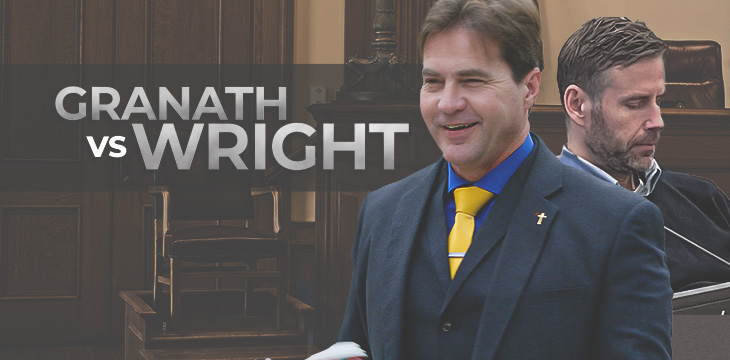|
Getting your Trinity Audio player ready...
|
Through seven days of the Granath v Wright trial, Magnus ‘Hodlonaut’ Granath has sat in the Oslo District Court flitting between expressions of vacant boredom, incredulous bemusement and bubbling frustration. But as he listened to teams of attorneys argue over whether Granath’s labelling of Dr. Craig Wright as a ‘scammer’ and ‘fraud’ amounted to unlawful defamation, Granath projected one emotion above all: disbelief.
He can’t have expected for things to ever get to this point. When he began his campaign targeting Dr. Wright and encouraging others to do the same, he likely felt that the anonymity afforded to him by his Twitter handle would protect him from ever needing to answer for his words to anyone.
So sure of this was Granath that when he received a pre-action letter from Dr. Wright’s lawyers, warning him of a potential lawsuit in the U.K. if Granath didn’t retract the tweets, Granath’s response was to immediately sue Dr. Wright in Oslo for a declaration that his tweets were not unlawful, hoping to force the issue on his home turf by causing the English courts to decline jurisdiction if Dr. Wright went on to sue him there. His hubris backfired (and not for the last time): the Oslo District Court accepted his case, but so did the English courts accept Dr. Wright’s.
Then, when trial finally began on September 12, it became apparent that Granath thought that all he needed to do to win over the court was to do as he has done on Twitter: simply tell them what a scam BSV is, and how Dr. Wright is a bad person and a self-evident fraud. He nonchalantly told the court that he made the tweets without providing any basis for the statements because it was simply the consensus in his environment. The Judge interjected, asking for clarity on what that environment is, to which the Magnus replied, “those who believe BTC is Bitcoin.”
This hubris was most obvious in his choice of witnesses. Granath called only three (aside from his KPMG experts) to testify on his behalf. These were Torbjorn Bull Jenssen, CEO of Arcane Crypto; Johan Toras Halseth, technology director of Firi and former Lightning Labs protocol engineer; and Svein Olnes, senior researcher at Vestlandfordking and a tenured academic.
Though the three were presented as general ‘crypto’ experts, it became clear that all three were in this same ‘environment’ as Granath. None of the witnesses had any first-hand experience with Satoshi Nakamoto or the events that transpired since Dr. Wright was outed as Satoshi. Instead, the focus of their testimony seemed geared solely to give the court the impression that ‘everyone’ knows that Dr. Wright is a fraud. Jenssen referred to the following of BSV as a ‘cult,’ and criticized Dr Wright’s communication style for ‘techno nonsense’ and ‘pseudo-philosophical.’ Halseth repeated second-hand accounts of the Gavin Andresen signing session, calling the fact that Gavin wanted to see the signing in person a ‘red flag.’
Like Granath, the witnesses take Dr. Wright’s supposed fraudulence as a given. Neither they nor Granath showed any self-awareness as they gave this testimony. None seemed to notice that they weren’t testifying about anything substantive, they were merely opining on Dr. Wright’s personality. One can imagine that they thought their bubble encapsulated most of the world, and that their bloviating about Dr. Wright would be met by the Oslo court in the same way it is met on Twitter: with uncritical acceptance. After all, they already know Dr. Wright is nothing but a scammer, so what could anybody possibly say to refute that?
It’s conceivable that Granath might have made it to the end of the testimony of his witnesses with this perception intact. But if he did, what happened next might have dismantled it entirely. Immediately following Granath’s witnesses came Dr. Wright’s, and far from being crypto executives picked straight form Granath’s social circle, they were people who had worked closely with Dr Wright on a professional level before anyone had ever heard of Bitcoin.
Unlike Granath’s witnesses, none of these came from Dr. Wright’s bubble. In fact, virtually none of them could even be described as existing within any kind of crypto bubble at all. Neville Sinclair is a retired partner at Grant Thornton who worked at BDO at the same time as Craig, though they weren’t direct colleagues: he testified that Dr. Wright’s technical skills are extraordinary and confirmed that the often-dismissed meeting between Dr. Wright and BDO partner Alan Granger, in which he pitched the partner on Bitcoin before it was released publicly—took place.
In a piece of testimony that was illustrative of what the general opinions of Dr. Wright are out in the real world, Sinclair said that he remembers being at a conference of IT security professionals working in the banking industry. An article had come out the day before about Dr. Wright’s involvement in Bitcoin. He said that given Dr. Wright’s work with banks and financial institutions via BDO, many of the attendees were familiar with Dr. Wright, and those people were all in agreement that he was the most likely candidate to have developed Bitcoin.
Robert Jenkins, an IT consultant who worked at Vodafone while they engaged Dr. Wright: he similarly remarked on his technical skills, saying that the security system Dr. Wright implemented for them was better than any he’d seen before or since. Jenkins also testified that Dr. Wright had proposed a trustless payment system to QDOS’ CEO and CFO.
Shoaib Yousuf, a managing partner at Boston Consulting Group, said that he was not at all surprised to learn that Dr. Wright had been exposed as Satoshi Nakamoto, having been taught by and studied alongside Dr. Wright at Charles Sturt University. Yousuf said that this was both because he found Dr. Wright’s intellectual capabilities to be such that he’d be able to invent Bitcoin and because the two had had conversations touching on many of the issues Bitcoin is famous for solving. Yousuf also confirmed the existence of the much-cited Port MacQuarrie farm in Australia, where Dr. Wright has always said much of the early work on Bitcoin took place. He testified that he was invited by Dr. Wright to the farm pre-2008 and was surprised to see that inside a shed on the property, Dr. Wright had installed computers, servers and built a 500-book research library.
Dr. Wright’s cousin, Max Lynam, also testified that Wright convinced him and his father to run the Bitcoin software on their home computer, causing them to mine 6,500 of the earliest Bitcoin. Though a techie himself, Lynam is far enough removed from the Bitcoin sphere to use ‘blockchain’ synonymously with ‘Bitcoin.’
Perhaps it’s assuming too much of Granath’s capacity for self-reflection to say that these witnesses would have come as a surprise to him. He and his cohort have spent years assuring themselves and anyone else who would listen that Dr. Wright is an irredeemable fraud, yet here are career professionals with reputations that exist independently of the crypto circus who are testifying under penalty of perjury that not only was Dr. Wright one of the most impressive professionals they’d worked with, but he was talking to them about Bitcoin concepts years before the general public had any idea what Bitcoin was.
At the very least, this must have given Granath pause, because if the statements made in his tweets are true, then that means all of these witnesses have flown to Oslo with the intention of lying to the court at great personal risk to their reputation and liberty.
Confronted with testimony of this calibre stacked up against that offered by Granath’s own witnesses—one of whom testified simply that Dr. Wright was ‘so far from the Satoshi that [he] had imagined’—Granath might now realize his hubris, and the reality that if you call somebody a fraud, you had better be prepared to be proven wrong. Perhaps it’s already happened: Granath waited until the final days of trial, after all of Dr. Wright’s witnesses had testified, to make a drastic change to his argument. Granath dropped the request for a declaratory judgment that his statement that Dr. Wright is not Satoshi is not unlawful, and replaced it with a rather more limited request: for a declaration that his statement saying that Wright is not Satoshi and is trying to fraudulently prove it, is not unlawful. Now all that’s left is to wait for the judge’s decision, which means any such realization will come too late.
Watch Granath vs Wright Satoshi Norway Trial Coverage Livestream Recaps on the CoinGeek YouTube channel.

 02-14-2026
02-14-2026 




